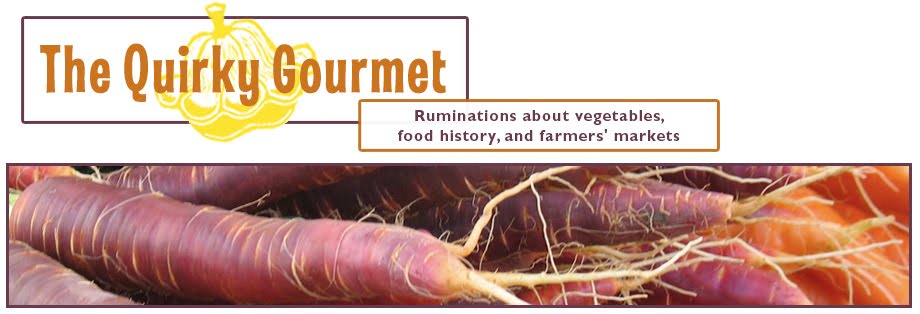 I own a business that makes the same food week after week, month after month, and year after year. The ingredients change seasonally, but the menu basically stays the same. So it's a big deal when we introduce a new menu item.
I own a business that makes the same food week after week, month after month, and year after year. The ingredients change seasonally, but the menu basically stays the same. So it's a big deal when we introduce a new menu item.This past fall we started selling beef tamales. We'd been selling only vegetarian tamales for years, in fact, our entire menu had been completely vegetarian until we introduced a beef chili in an effort to limit competition at the Jubilee Farm pumpkin patch event. (They were talking about bringing in a burger vendor for the omnivores.) The chili was really tasty, but it was more work than we'd anticipated and it just didn't sell well.
The beef tamales however, were an instant hit. Once we introduced them at all of our markets, we quickly began selling more of them than of both of the vegetarian varieties combined. There were a couple of pissed off vegans, but not nearly as many as we'd expected. Ironic as it may sound, I felt like it was a step in the right direction as far as my big picture objective of encouraging folks to eat less meat. There's an ounce of beef in a beef tamale. If someone chooses to eat one along with a big pile of locally grown vegetables on the side instead of eating a burger or a hot dog, I feel like I'm making a difference.
We began buying our meat from Crown S Ranch, in Winthrop. My household has been enjoying their fine products for years, and they gave us a great deal on some overstocked meat that had been shaped into hamburger patties. We did some mutually beneficial cross marketing.
I drove out to visit the farm in late October. As the author of two vegan cookbooks, I wanted to be able to tell customers that I'd visited the farm that was raising the animals that went into my tamales, and I felt good about using their products.
It was a magical place. Jennifer and Louis, the owners, are both engineers and they've designed a wealth of technologies and systems --some simple, some complex--to make the most of natural cycles and synergies, and raise tasty, healthy animals. At one point Jennifer was showing me around and explaining some of the systems, and she stopped in mid-sentence, gestured at a nearby cow, and said, "Let's move away a bit. I'm talking too loud, and I'm stressing her out."
By the end of the visit, we'd brainstormed all kinds of ways we could collaborate. To start with, I agreed to make tamales using their beef and pork, for them to sell in their farm store and distribute to their wholesale accounts. They'd provide the meat, and I'd charge them a wholesale price that didn't include marking up the most expensive ingredient.
She ordered more than 700 tamales, and I made them and froze them for a pick-up in a couple of weeks. A week later, she sent me an email regarding a much smaller batch of tamales I'd brought to the farm store when I visited. Customers were asking whether I was using GMO corn and she was curious about the answer.
The GMO issue has always been a tricky one for me. On the one hand, I want good, clean food as much as the next person. On the other hand, I have a great working relationship with the Mexican distributor who suppliers my masa and corn husks, and their products make wonderful tamales. I could get a non-GMO masa from the behemoth natural foods distributor, but I have to drive far to get it, and they don't treat me like they value my business. I'm also not as happy with the way the tamales come out when I use that masa.
And yet Jennifer's email was so friendly and non-judgemental that I found myself revisiting the issue. I researched prices, tried thinking outside the box, and made a sample batch. I found myself liking them more.
But I still had more than 700 tamales in the freezer made with the GMO corn. I offered her an out. I'd been using this masa for many years, and I knew I'd be able to sell these tamales. If she wanted to wait until I could use all non-GMO ingredients, that wasn't a problem for me: I'd simply pay for the meat that she'd provided.
She bought them anyway, saying that she'd just treat them as a transitional batch. In the meantime, I went ahead placed an order with the behemoth natural foods distributor for quite a bit of the non-GMO masa. I've even found parchment paper "corn husks" that have the look and feel of the real thing.
Once I got started, I began revisiting all of my other ingredients as well. I've always been comfortable with ambiguity and contradiction, and I believe that incremental change can be as effective as all-or-nothing dogmatism. I use plenty of clean, local, organic ingredients, but I also use GMO masa and cheap, industrial cheese. I've never set out to provide an absolutely wholesome product. Instead, I've aimed to create a reasonably wholesome product that's a great value.
For the most part, the few customers who have called me out about these inferior ingredients over the years have seemed smug and self-righteous, and that kind of attitude makes me want to dig in more than it makes me want to change. But Jennifer's attitude about the tamales was sensible and easygoing, and it really got me thinking.
